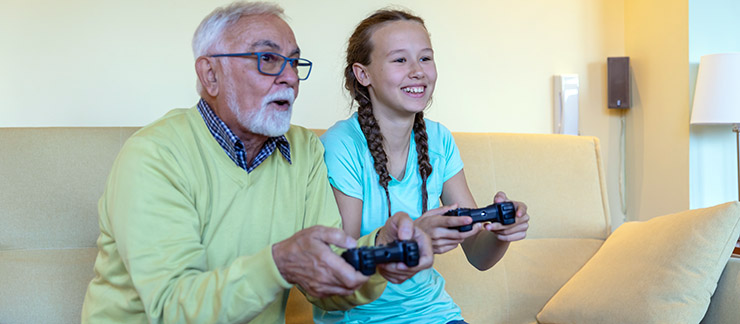Critical Advice for Adult Children Who Feel They "Always Need to Be There" for Aging Parents
The last time you visited Dad, your heart sank as you drove away.
The house was a mess. Dad looked like he hadn’t bathed in several days. The refrigerator was almost empty. He seemed himself, but slightly confused. Moreover, these are only the problems you saw during your visit. You can only imagine what could happen without you there.
Would he leave the stove on when he made dinner later that day? Might he travel somewhere and forget why he left the house? Would he forget to pay the electric bill? These are just a few of things adult children consider when they notice their aging parent starting to change, and it often makes them feel like they always need to around for this person.
What Adult Children Worry About
Changes in an aging parent can sneak up on you, and sometimes more drastic declines occur with a new diagnosis, or after a bad fall, a difficult surgery or the death of a spouse. Wherever you find yourself on that spectrum, take note of your anxiety: has it increased with every phone call or visit to Dad’s? Are you losing sleep wondering if Dad fell while trying to get into bed? Are you finding yourself distracted at the office because you fear that when you arrive after work, you’ll find Dad unresponsive? Are you trying to figure out how Dad could ever afford assisted living?
You’re not alone. There are 40.4 million unpaid caregivers of adults ages 65 and older in the United States, and of that group, nine out of ten are providing care for an aging relative. If this sounds like your current situation, then understand that things have changed. The finality of such a thought can seem daunting, but making peace with your parent's age and situation is vital to acting in his best interest.
Start recording the changes you’ve seen and the worries you have when you’re not there. It doesn’t have to be a formal document, just keep a journal or jot things down in a notepad as you think of them. Having this record will be helpful in talking to siblings who may not be aware of a parent’s decline because they may not be close enough to your parent’s situation. Documenting his symptoms and behavior will provide a foundation as you consider bringing in additional help.
Recognizing You Can’t Always Be There
If you know Dad wants to stay home for as long as possible, know that to do so safely, he may need more help than you can realistically provide. You may feel you always need to be there, but you know you can’t. Don’t stack guilt on top of your anxiety: you are one person, and you have the important role of advocating for what’s best for your parent. Trying to shoulder the massive responsibility of caregiving, on top of your own life, can rapidly result in burnout.
Many adult children are sandwiched between job responsibilities, children of their own and nurturing relationships with spouses and friends. Even if you're in good health, you might be doing physical therapy after a minor procedure on your knee last summer — and to maintain mobility, that PT is vital. Your health could be at risk if you're not getting adequate rest or proper nutrition, and as some adult children take on more responsibilities for an aging parent, these self-care basics fall to the wayside.
One of the most important early lessons a new caregiver can learn? While caregiving requires you to think of and put another’s needs before your own, if you ignore your health, you won’t be able to provide the best care for your loved one. When the feelings of guilt and worry overwhelm you, remember that you need to stay strong for Dad — and to do that well, it’s okay to seek help.
Practical Solutions for Your Loved One
You know your parent best, and it's probably why you feel it's easiest to take care of everything, but you must know you can’t do this alone. Make a list of all the things you do and have done for Dad in the past few weeks (keep these notes in the same notepad or folder where you’ve been recording changes in your parent). First, let this exercise be a testament to the ways you’ve been there for your parent. As Dad experiences a decline, you might feel like you’re not doing enough, but this list will reaffirm your attention to detail and that you’ve only been acting with your parent in mind.
Use this list to make your life easier. What are things you could easily take off your plate and delegate to another? Maybe you can help your dad with all that laundry and dishes, but it’s a bit awkward when it comes to personal hygiene. Situations like this occur all the time, and it's a good reason to consider home care services. Alternatively, maybe it’s not a matter of tasks, but you miss just having a conversation with Dad, a father-daughter heart-to-heart, but there’s not much time for that when you must continually perform tasks or run errands. Not only will this leave little time for meaningful interaction, but it can rapidly make you resent the situation and you’ll start to treat a trip to Dad’s house as a massive chore.
These are the kinds of things a professional caregiver can do so that you can take a break to recharge, have that backup support for a crisis, or know that Dad will be okay until you get home from work. Maybe Dad is lonely when you’re not there. Social isolation can be a catalyst for mental and physical decline. Don’t wait to get help. Acting early will not only spare you the pains of burnout but ensure a higher degree of comfort for your parent as he ages.
Finding Help for When You Can’t Be There
Expand your definition of “getting help at home.” It doesn’t mean giving up the things you love to do for Mom, it just means you don’t have to do everything. If you have siblings who are willing to help, delegate tasks to them. If your Dad has good friends in the area who have offered to help, coordinate with them on a rotating schedule of weekly social visits. If your job and your family are demanding more of you, work with a professional caregiver to do things like laundry and meal prep to free up your schedule.
Remind yourself often that getting help is not a sign of failure. It’s the opposite: you’re strengthening a loved one’s support system and creating a care team that also supports you in your efforts.
The beauty of home care is that it complements what you do: learn more today about tailoring a plan to meet your family's unique situation best.













